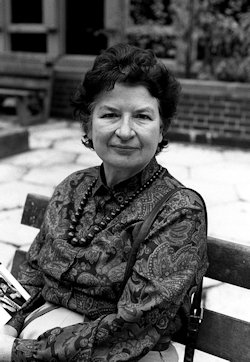P. D. James, born Phyllis Dorothy James on the 3rd of August 1920, passed away peacefully at her home in Oxford last Thursday morning. She was 94 years old.
She was “a much-loved mother, grandmother and great-grandmother,” according to a statement from her family, and the author of twenty-odd tremendously successful novels, most notably the many mysteries starring Scotland Yard’s Adam Dalgliesh.
It was with the first of these, Cover Her Face, that James made her debut in 1962, and though she took a few momentous detours over the years, she was to return to her prized poet and police chief repeatedly until 2008’s The Private Patient.
James reflected on the relative success of the series in an interview with The Guardian in 2001, stating that she “started out as more of a cult writer. The one that broke through [in Britain] was Shroud For A Nightingale. The huge international bestseller,” however, was Innocent Blood, one of her rare and appropriately precious standalone stories. “At the beginning of the week [of its release] I was relatively poor and at the end of the week I wasn’t.”
She wasn’t ever again, either. All told, over the course of her career, Bookscan—by way of The Bookseller—says she sold approximately two and a half million books.

Only one other new novel was to bear James’ name in the six years since the publication of The Private Patient: a sequel of sorts to Jane Austen’s Pride and Prejudice. Death Comes to Pemberley was successfully adapted for TV by the BBC last year, and it wasn’t the only one of James’ numerous novels to make the transition. There have been several incarnations of Adam Dalgliesh across the generations, and James’ sole work of speculative fiction, 1992’s The Children of Men, was a decade and change later made into a BAFTA Award-winning film by Gravity’s Alfonso Cuarón.
Unlike a couple of her contemporaries, James didn’t feel the need to excuse the fact that she’d written a genre novel. Indeed, in her view, she’d been writing genre novels since day dot. “It is perfectly possible to remain within the constraints and conventions of the genre and be a serious writer, saying something true about men and women and their relationships and the society in which they live,” she asserted in one of several pre-emptive celebrations of her life as a writer.
And what a life it was.
Ruth Rendell, James’ sister in crime writing, remembers:
“In 1987 the great hurricane swept across eastern England, destroying 120 trees in the wood in Suffolk where my husband and I lived in a very old farmhouse. We decided to replant the wood as far as we could and also use the trees to have furniture made. A wonderful local cabinet-maker made me a sycamore bed that I still sleep in.
“Phyllis came to stay and said she would like a bed too. […] It took ages for the bed to arrive, she waited and waited and then went to see the cabinet-maker and told him he must hurry up because she would die before he finished it—and that she would haunt him if he didn’t do it quickly. That was nearly 30 years ago.”
To paraphrase Val McDiarmid: last week, we lost a legend.
Now I don’t know about you, but I’m going to go read The Children of Men again.
Niall Alexander is an extra-curricular English teacher who reads and writes about all things weird and wonderful for The Speculative Scotsman, Strange Horizons, and Tor.com. He’s been known to tweet, twoo.










